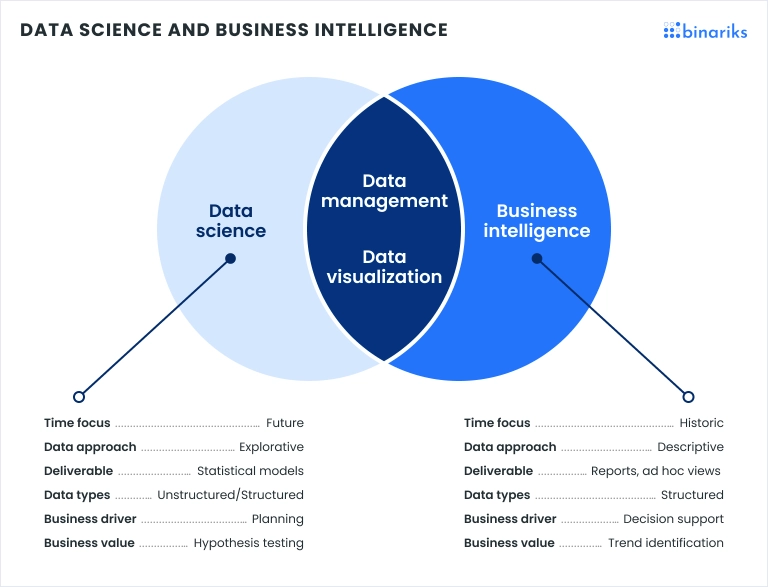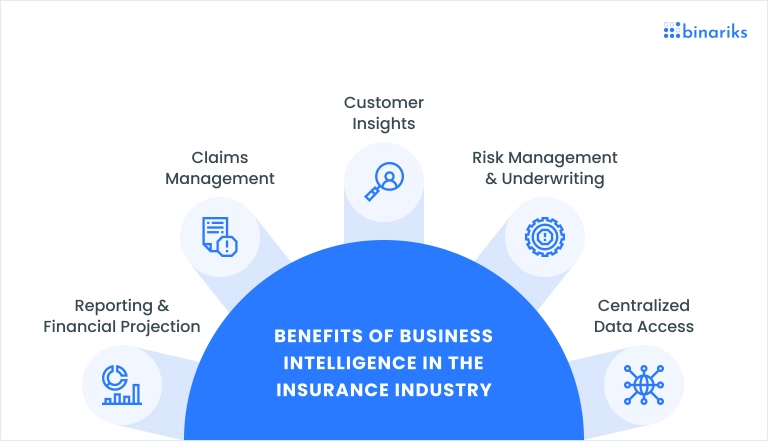The insurance industry, long reliant on actuarial tables and educated guesses, is undergoing a data-driven revolution. Business intelligence tools are transforming how insurers operate, unlocking a treasure trove of previously siloed or underutilized information.
Policyholder demographics, claim histories, and economic trends can now be analyzed holistically through business intelligence for insurance.
Before the advent of modern BI, insurers often struggled with:
- Inefficient data management: Disparate data sources made it difficult to glean meaningful insights.
- Slow decision-making: Manual data analysis hampered timely responses to market changes and customer needs.
- Limited visibility: A lack of clear data visualization restricted insurers' understanding of KPIs.
BI for insurance addresses these issues head-on. Being defined not by technology but by how a business works in general, they foster a data-driven culture that empowers insurers to make informed decisions, optimize operations, and achieve sustainable growth.
This article delves into the world of insurance BI to expose the inner workings of its powerful tools, analyze their benefits, and ultimately reveal how BI is rewriting the rules of the insurance game.
Comprehensive overview of business intelligence
Business Intelligence refers to the technologies, strategies, and practices organizations use to analyze raw data and transform it into meaningful and actionable insights.
The primary goal of BI is to facilitate data-driven decision-making within an organization by providing stakeholders with timely and relevant information. This process typically involves collecting, integrating, analyzing, and visualizing data from various sources, such as databases, spreadsheets, and enterprise systems.
BI tools and techniques enable organizations to identify trends, patterns, and relationships in their data, helping them understand their business performance, identify opportunities, and mitigate risks.
But what about data science?
Having explored the definition of business intelligence and its role in enhancing decision-making, one might wonder how it contrasts with data science. Roughly speaking, isn't it the same?
While BI and Data science share similarities in their goal of deriving insights from data, they differ in their approaches and methodologies.
Data science encompasses various techniques, including AI and machine learning in particular, to forecast future outcomes and develop solutions for the future.
BI focuses on descriptive analysis, which involves analyzing historical data to understand the organization's past performance and make informed decisions regarding its current performance.

Business intelligence key tools
Some common BI technologies include:
- Dashboards: Interactive visualizations that give users a real-time overview of KPIs and business metrics.
- Reporting tools: Software applications that automate the generation of reports and summaries based on predefined criteria, allowing users to analyze trends and patterns in their data.
- Cloud data services: Cloud-based platforms that enable organizations to store, manage, and analyze their data remotely, providing flexibility and scalability.
- Predictive analytics: Techniques and algorithms used to forecast future outcomes and identify potential opportunities or risks based on historical and current data, including churn prediction.
- Data discovery tools: Applications that allow users to explore and analyze data interactively, uncovering insights and trends through visualizations and interactive dashboards.
By combining the strengths of business intelligence and data science, organizations can gain a holistic view of their data, from historical trends to future projections, allowing them to optimize their operations, identify new opportunities, and drive innovation.
Embrace InsurTech innovation with custom software development
Why does the insurance industry need BI solutions?
Insurance companies need business intelligence to sort through customer records, claim reports, and market trends to identify patterns and present findings in clear, concise reports and visualizations. Here are several key reasons behind BI in the Insurance sphere:
- Competitive advantage: BI offers insurers a crucial edge in an increasingly competitive landscape. By meticulously analyzing market trends and competitor strategies, insurers can innovate and tailor their offerings to meet evolving customer needs, ensuring they stay ahead of the curve.
- Data-driven regulatory compliance: The insurance industry operates within a complex regulatory environment. Business intelligence in insurance provides companies with real-time insights into their data, facilitating adherence to regulatory requirements. By proactively identifying and addressing compliance issues, insurers mitigate risks and avoid potential penalties.
- Streamlined operations and efficiency: Business intelligence is transforming insurance as it sheds light on operational bottlenecks and inefficiencies within the industry. By analyzing data on claim processing times and customer interactions, BI helps identify areas for improvement, leading to faster turnaround times and a smoother customer experience .
How would the insurance industry use business intelligence?
The insurance industry operates in a world of constant flux—market trends shift, customer needs evolve, and fraudsters dream up ever-more-sophisticated schemes. In this dynamic environment, relying solely on gut instinct and outdated formulas just won't cut it. It's crucial to adapt, and this is precisely where business intelligence for insurance companies swoops in as a game-changer.

Here's a breakdown of the key reasons why it is becoming an essential ingredient for success:
- Enhanced risk assessment: Insurance business intelligence tools helps to analyze vast amounts of data, including historical claims, demographics, and even weather patterns. This allows them to create accurate risk profiles, leading to fairer premiums and better decision-making.
- Fraud detection: Traditional methods of fraud detection are often reactive. Business intelligence for insurance, however, takes a proactive approach. By analyzing claims data in real-time, BI can identify suspicious patterns and red flags, allowing insurers to nip fraudulent activity in the bud.
- Customer segmentation: Business intelligence in the insurance industry helps companies segment their customer base using demographics, behavior, and preferences. This enables personalized marketing strategies, tailored product offerings, and optimized customer engagement initiatives, fostering stronger customer relationships and driving higher retention rates.
- Pricing optimization: With BI, insurers can leverage advanced analytics to optimize pricing strategies based on risk profiles, market trends, and competitive dynamics. This data-driven approach ensures that premiums are aligned with risk exposure, enhancing underwriting profitability and market competitiveness.
- Customer churn prediction: Some tools of business intelligence for insurance facilitate predictive analytics to forecast customer churn probabilities, allowing insurers to identify at-risk policyholders and implement targeted retention initiatives. By proactively addressing churn drivers and enhancing customer satisfaction, insurers can minimize attrition rates and maximize customer lifetime value.
- Customer lifetime value (CLV) analysis: Businesses can utilize business intelligence for insurance to analyze customer lifetime value, encompassing the total value of a customer's business over the relationship duration. This allows for more informed decisions regarding acquisition costs, retention strategies, and cross-selling opportunities, ultimately maximizing long-term profitability and sustainability.
- Claims management: Lastly, BI streamlines claims processing workflows by analyzing data on claims frequency, severity, and processing times. This enables insurers to identify inefficiencies, automate routine tasks, and improve claims handling efficiency, leading to faster settlements and enhanced customer satisfaction.
As you can see, BI is a robust toolkit that enables insurers to navigate the complexities of the modern insurance landscape, leading to more sustainable business success.
Tools & business intelligence software for insurance
According to Consultancy-me, almost half of insurance companies have a Chief Data Officer (CDO). Insurance has the highest CDO penetration rate of any current industry. Other industries with high CDO penetration rates are banking (42%), media and entertainment (40%), retail (29%), and IT/technology (28%).
Why? Insurers want to unlock the potential of their data and increase profitability. How? Here is some effective business intelligence software for insurance companies designed or widely used to meet their specific needs:
Verisk
A comprehensive suite leveraging artificial intelligence (AI) and machine learning to provide data-driven analytics across the insurance lifecycle. Verisk empowers companies to get all kinds of benefits of insurance business intelligence: underwriting, claims, risk management, and fraud detection.
Zywave
Focuses on risk mitigation through a suite of tools designed for the insurance industry. Zywave offers functionalities for policy management, claims processing, exposure analysis, and loss control, allowing insurers to proactively manage risks and improve overall profitability.
Elemica
This piece of insurance business intelligence software specializes in data visualization and reporting. Elemica allows insurers to consolidate data from various sources and create interactive dashboards and reports. This empowers insurers to gain insights into customer behavior, claims trends, and operational performance, ultimately driving better decision-making.
Majesco
A core insurance processing system (CIP) with integrated BI capabilities. Majesco Policy offers a comprehensive solution for policy administration, underwriting, claims, and billing, all with built-in analytics and reporting features. This allows insurers to gain insights directly from their core system, streamlining data analysis and decision-making.
Remember, consider your specific needs and budget when selecting a BI tool. Explore various tools and consider requesting demos to ensure you find the best fit for your insurance company.
Collision management platform
We built a scalable front end for insurtech apps and added several new features for the client's software
Binariks can help with BI for insurance
Generic software may not capture the unique needs of your company. Binariks offers custom solutions designed to unlock all the benefits of insurance business intelligence.
- Our team of data experts will collaborate closely with you to define your specific goals and challenges. We will thoroughly analyze your business objectives and identify the key performance indicators (KPIs) crucial for your insurance operations.
- We don't just scratch the surface. Our experts will thoroughly analyze your existing data landscape, pinpointing the most crucial data sources across your various departments – claims, underwriting, policy management, and more.
- We can transform complex insurance data into clear, compelling visualizations and reports that translate insights into steps. Imagine readily identifying fraud patterns, optimizing risk management strategies, and personalizing customer experiences – all driven by data-driven decisions.
- Need to delve even deeper? We can leverage the power of cutting-edge analytics and machine learning in partnership with data science specialists. This empowers you to uncover hidden trends, predict future outcomes, and confidently make data-driven decisions.
Our commitment doesn't end at implementation. We provide ongoing support and maintenance to ensure your BI solution continues to evolve alongside your business. As your data landscape grows and your needs change, we'll adapt and optimize your solution for continued success.
Ready to harness the power of BI for your insurance business? Contact Binariks today to schedule a consultation. Let's discuss how we can help you achieve your goals.
Conclusion
With the power of business intelligence solutions for insurance companies, you can confidently embark on a transformative journey. Custom BI solutions empower insurers to unlock the hidden potential within their data, transforming it into insights that drive efficiency, profitability, and customer satisfaction.
Looking ahead, the future of BI in insurance is bright. Emerging artificial intelligence and machine learning trends will further enhance data analysis capabilities. This allows insurers to gain even deeper insights from complex data sets, leading to more sophisticated fraud detection, hyper-personalized customer experiences, and optimized risk management strategies.
Share

